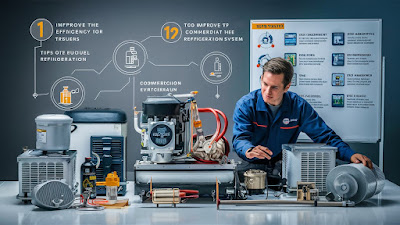The efficiency of refrigeration systems is essential for the proper functioning of commercial environments, especially in sectors such as supermarkets, restaurants and warehouses. Improving the efficiency of these systems not only reduces operating costs, but also contributes to environmental sustainability. In this article, we present practical tips for optimizing the efficiency of refrigeration systems in commercial environments, ensuring energy savings and optimal performance.
1. Regular Maintenance:
Regular maintenance is essential to keep refrigeration systems operating efficiently. This includes cleaning coils, checking for refrigerant leaks and replacing dirty filters. A well-maintained system consumes less energy and is less likely to fail. In addition, preventive maintenance helps identify problems before they become serious, avoiding unexpected downtime and high repair costs.
2. Proper Insulation:
Good insulation is crucial for the efficiency of refrigeration systems. Check that refrigerator and freezer doors are sealing properly and that there are no air leaks. Using air curtains or plastic doors in storage areas can help maintain indoor temperatures, reducing the workload on the refrigeration system. In addition, properly insulating refrigerant lines can prevent heat loss and improve overall system performance.
3. Monitoring and Control:
Investing in monitoring and control systems can make a big difference in energy efficiency. Smart thermostats and energy management systems allow you to precisely adjust the temperature and monitor energy consumption in real time. These devices can send alerts in case of anomalies, allowing quick corrective actions. In addition, using timers to turn off equipment during off-peak hours can significantly reduce energy consumption.
4. Choosing Efficient Equipment:
When purchasing new refrigeration equipment, opt for models with high energy efficiency. Make sure that the equipment has efficiency certifications, such as the Procel seal in Brazil. Modern equipment, such as variable speed compressors and LED lighting in display cases, consume less energy and offer better performance. While the initial investment may be higher, the long-term energy savings are worth the additional cost.
Improving the efficiency of refrigeration systems in commercial environments is an ongoing task that requires attention to detail and strategic investment. Regular maintenance, proper insulation, the use of monitoring technologies and the selection of efficient equipment are key steps towards achieving more cost-effective and sustainable operations. By implementing these tips, commercial property owners and managers can not only reduce their operating costs, but also contribute to preserving the environment.
